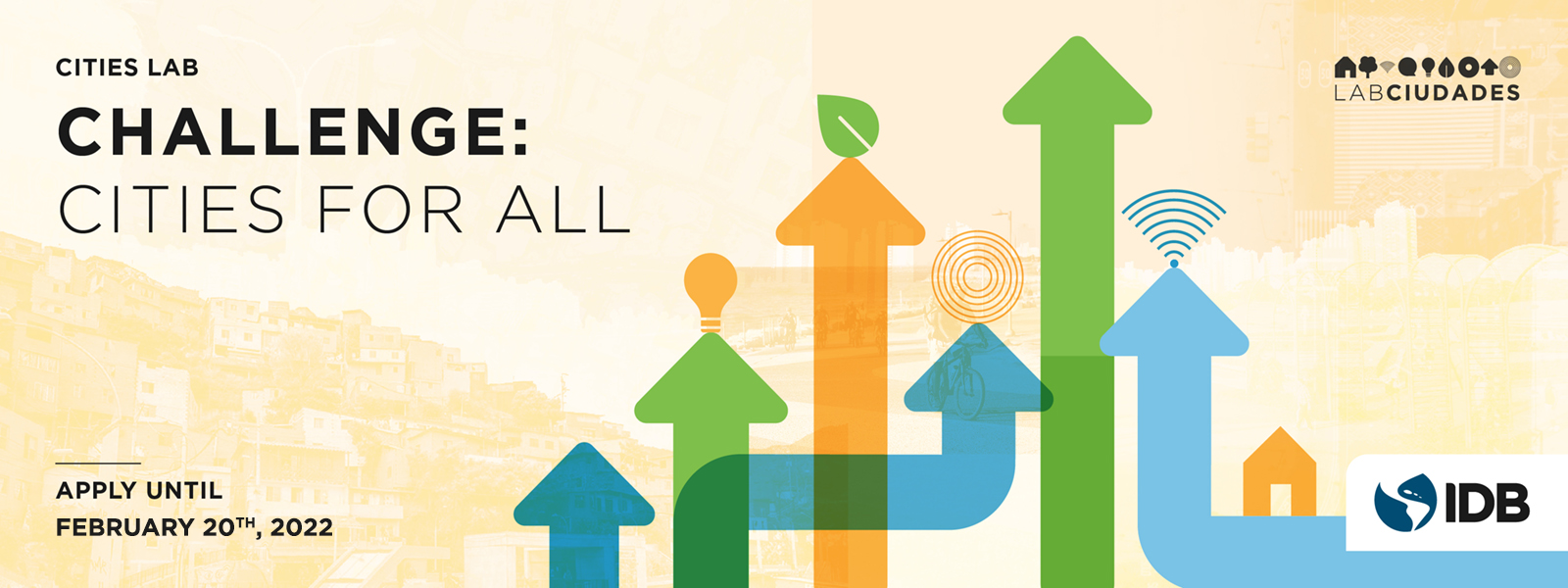Este artículo está también disponible en / This post is also available in: Spanish
In today’s blog, the IDB Cities Laboratory presents the Cities for All Challenge. We are looking for local government officials to design and test innovative solutions to urban problems, and thus contribute to establishing a culture of public innovation. Keep reading to learn more details about this call!
How to establish a culture of innovation in governments? Two of the biggest challenges to public innovation are community mistrust and lack of collaboration between the public and private spheres. In general, to build trust with the community, local governments should consider the following aspects:
- Ensure that citizens, government, and other actors understand the benefits of innovation
- Establish a relationship with citizens, universities and the private sector through dialogue and joint work
- Make visible the results obtained in the projects, no matter how small, making known the value that is in them
To generate a culture of innovation, it is recommended that, when experimenting, the scale of the projects be limited -in the form of pilots- and that the solutions proposed be diversified to have a wide margin of success or error. Aspects such as incorporating local knowledge, or sharing the same language with the community, are key to finding innovative solutions.
THE CHALLENGE
The IDB Cities Laboratory is a platform that works to foster innovation and urban experimentation for the sustainable development of cities in Latin America and the Caribbean (LAC). Our goal is to identify and analyze innovation trends, connecting cities to share solutions, and promoting experimentation. The Cities for All Challenge was born with the purpose of identifying urban challenges in cities of the region. This, in turn, will allow us to work together with them and their innovative teams to identify solutions.
Within this contest, we seek to contribute to innovation in LAC in three ways:
- Working hand to hand with local teams and their innovation laboratories in the search for solutions, supporting pilots with technical assistance and mentoring processes
- Supporting cities to consolidate their innovative, multisectoral and interdisciplinary teams
- Establishing a work model where failure is seen as just another part of the learning and innovation process
WHAT CHALLENGES ARE WE LOOKING FOR?
We seek to identify urban challenges associated with systemic vulnerabilities that accentuate inequity in the cities of our region. By challenges we mean vulnerabilities such as:
- Poor access to financing and quality housing solutions
- Inadequate access to basic services
- The socio-spatial disconnection of informal neighborhoods with formal ones
- Limited or no access to information and communication technologies
- Vulnerability and resilience to climate change and natural disasters
- The few opportunities for formal employment.
The objective is to identify challenges that can be solved through experimentation processes (prototype scheme, pilots, iterative solution models, etc.), in order to design innovative, replicable and scalable solutions.
WHO CAN PARTICIPATE?
This call is aimed to entities that promote urban innovation, as part of, or in alliance with, city governments of any of the 26 IDB borrowing member countries in LAC. For example:
- An urban innovation laboratory or an innovation office/unit that is part of a city government.
- A national, regional or local innovation agency or laboratory that is associated with one or more city governments.
- A university or civil society group that works on innovation in cities, and that is associated with one or more city governments.
THE AWARD
What do you receive if your proposal is selected? Six semifinalist teams will be chosen and will participate in a mentoring process to improve the definition of the challenge, which will be presented on a pitch day. Of these six teams, 3 winning teams will be selected to receive technical assistance from the IDB (up to USD$35,000) to work on an iterative experimentation process that consists of the co-design, implementation and evaluation of a prototype or pilot project that contributes to solving the challenge posed.
NOTE: The amount of up to USD$35,000 will not be provided as financial resources in cash or in kind, but in the form of services to be financed for the design, implementation and evaluation of the pilot project.
HOW CAN YOU PARTICIPATE?
Those who wish to participate must complete the online application form before February 20, 2022 and meet the requirements indicated on the IDB opening website. A team of IDB experts will review, analyze and evaluate the proposals received. Finally, the 6 semi-finalist teams that will go on to the next phase will be selected. Proposals will be evaluated based on the following criteria:
- Feasibility that the challenge can be solved through innovation
- Dimension of the challenge
- The challenge responds to the needs of the beneficiaries
- Relevance of the experience and background of the applicant entity in the design and implementation of innovative solutions
- Strategic alliances of the applicant entity with other actors
- Feasibility that the challenge can be solved through experimentation processes
Are you ready to participate? Do not miss this opportunity and register your application here. Registration is open until February 20, 2022.
If you enjoyed this blog, sign up here to receive our monthly newsletter with all the blogs, news and events from the IDB Urban Development and Housing Division.


Leave a Reply